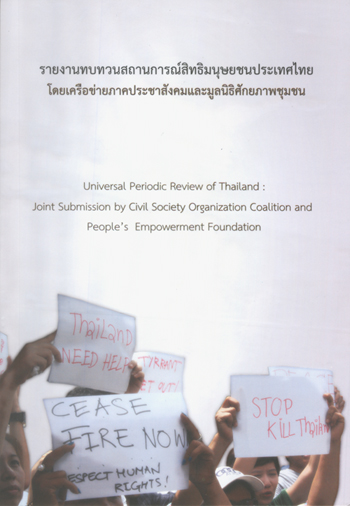Thailand’s Universal Periodic Review (UPR) on its human rights situation is due for consideration on 5 October, prompting a public discussion organized by Chiangmai University’s Faculty of Law yesterday when copies of a joint submission by Civil Society Organization Coalition were distributed.
 The submission, endorsed in whole or part by 96 CSOs, including those well known by activists from Burma such as Thai-Burmese People Friendship, Friends Without Borders and Friends of Burma.
The submission, endorsed in whole or part by 96 CSOs, including those well known by activists from Burma such as Thai-Burmese People Friendship, Friends Without Borders and Friends of Burma.
On migrant workers issue, it has recommended to the Royal Thai Government to:
d) provide education welfare to cover children of Thai and migrant workers to bring them access to the education system
e) eliminate all forms of exploitation of migrant workers, open a migrant labor registration and ensure all fees related to the process are reasonable
f) ensure protection of all migrant workers under the labor protection law and abolish discriminative policies against migrant workers
g) promptly issue the Ministerial Regulation to determine status of children of undocumented parents and revoke any law that automatically renders them illegal immigrants
h) ensure that the right to register a marriage of migrant workers can be exercised and that the registrars will only ask for documents as required by the law
On the issue of refugees, indigenous persons and stateless persons, it has called for the government to:
a) allow related agencies involved in the registration of unregistered and newly arrived refugees access to refugees so that they will receive identification documents and protection
b) cancel the detention of asylum seekers in the Immigration Detention Center, as it forbids UNHCR access to refugees
c) become a member to the UN Refugee Convention as soon as possible
d) allow organizations working to protect refugees to give assistance to the vulnerable groups
e) prevent local officials from expelling refugees into further danger
f) formulate clear policies in assisting in the repatriation of refugees and assisting the relevant agencies to be involved in analyzing the situation for the safe return of refugees, allowing them to remain in Thailand if the situation in their home countries is not safe
g) give opportunity to refugees to receive basic rights such as education and employment
h) recognize human trafficking problem that persists among the Rohingya population in Thailand and establish a legal framework and effective mechanisms to deal with the issue
i) work toward a third-country solution to resettle Rohingya refugees
j) establish an appropriate registration system for stateless people
k) make amendments to the law to protect stateless persons and refugees from persecution, guaranteeing them basic human rights in accordance with universal standard
l) ratify the 1954 Convention Relating to the Status of Stateless Persons and the 1961 Convention on the Reduction of Statelessness.
Thailand is not state party to the 1951 Refugee Convention and the 1967 Protocol Relating to the Status of Refugees.
Mawn Hawm of Shan Women’s Action Network (SWAN), the group that shot to fame with its damning report License to Rape (2002), was a discussant there. “The elections in November have done nothing to prevent the Burma Army from launching offensives against hither to ceasefire areas which have resulted in continued outflow of migrants and refugees into neighboring countries,” she said.
Shans arguably have the biggest migrant population in Thailand but the smallest number of refugees, officially termed “persons affected from combat”: 673 or 0.5% of that total refugee population.



